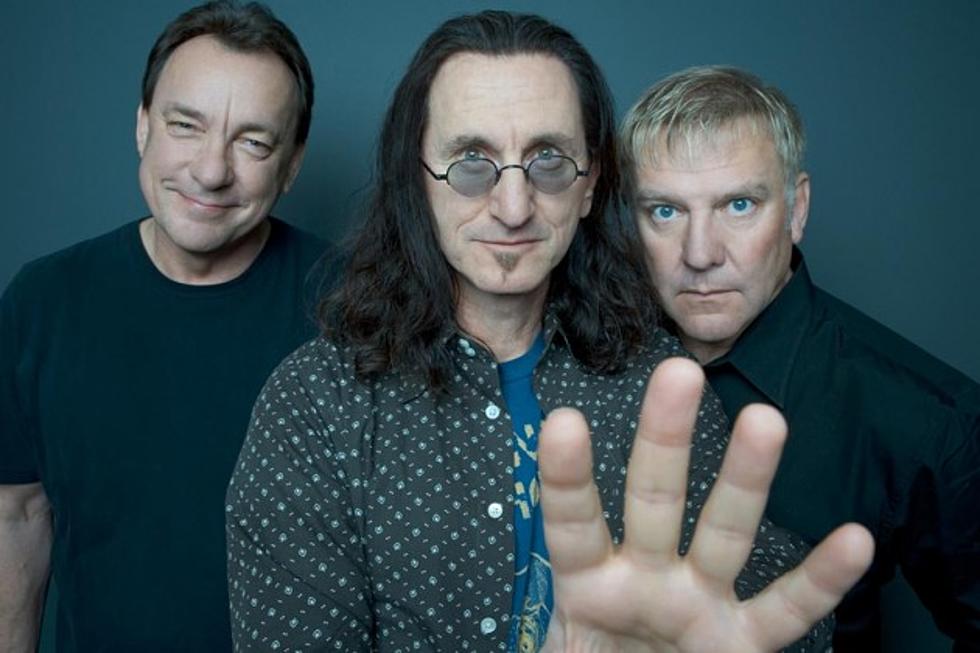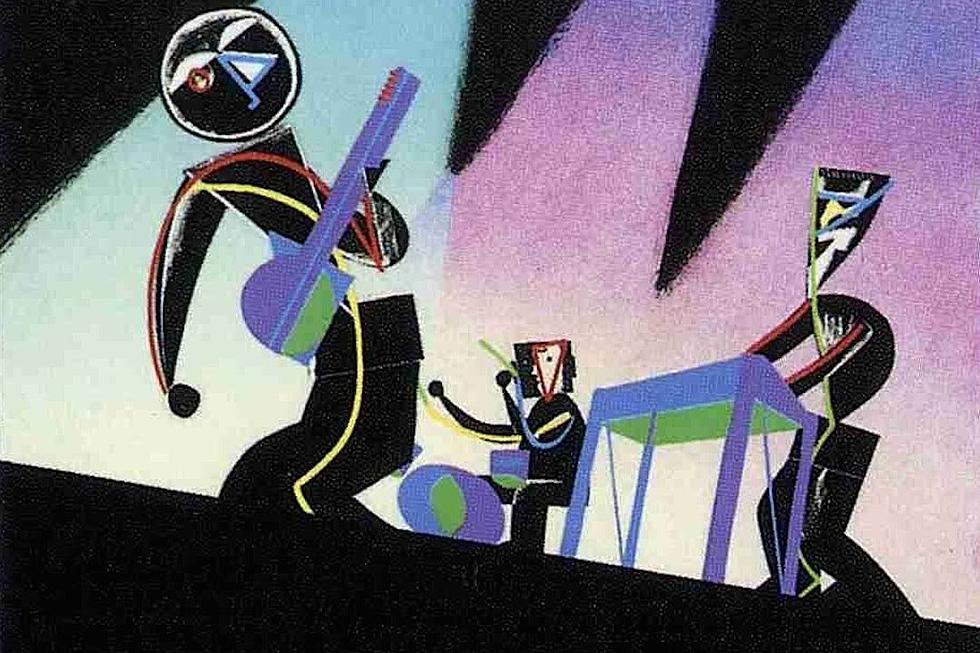
Rush’s Rolling Stone Cover Story: 12 Things We Learned
Rush's long-awaited appearance on the cover of Rolling Stone doesn't disappoint. Writer Brian Hiatt (who proudly admits to being a longtime Rush fan) hung out with all three band members -- singer and bassist Geddy Lee, guitarist Alex Lifeson and drummer Neil Peart -- and delved into their lives, music and future. There are many interesting nuggets for fans (as well as hilariously deadpan one-liners from each Rush member), but here are 12 things we found particularly illuminating about the story.
Rush and Kiss had a special bond, despite their ideological differences.
Perhaps unsurprisingly, the story makes it clear the two bands diverge when it comes to self-promotion. Peart, while being careful to say he "[doesn't] want to knock" Kiss, in particular describes a scene in a bar where "a guy with Kiss Army tattoos kept playing Kiss songs on the jukebox. He believed in a marketing campaign, swallowed it as religion. He was like a convert to Scientology." However, that doesn't mean Rush and Kiss didn't find common ground when they toured together back in the day. "We would get high with Ace Frehley in his hotel room and make him laugh," Lee said, "and they were a really good influence on us in terms of learning to put on a show."
Neil Peart's teenage mischief-making helped his drumming skills.
A die-hard Keith Moon fan, Peart (like many restless, aspiring drummers) irritated his high school teachers due to his desk drumming. Bizarrely, his punishment consisted of ... a teacher "insist[ing] that he bang on his desk nonstop for an hour's worth of detention, time he happily spent re-creating Keith Moon's parts from Tommy." The drummer also used to keep the late Who drummer, er, close to his heart: "For years, Peart wore a piece of one of Moon's shattered cymbals around his neck, retrieved from a Toronto stage after a Who concert."
Rush never considered expanding beyond being a trio, even during the heavily synthesized days.
When Rush play their keyboard-augmented output live, Lee's job as a musician gets infinitely harder: He's frequently alternating between playing bass and synthesizer. Yet the band has never been interested in having someone else help out with these more elaborate moments. "Every rehearsal, I was screaming, 'I can't do it!' " Lee said. "But it just felt wrong to have another dude onstage with us. We talked about it all the time — we still talk about it! But it's a no-go zone, can't do it."
Alex Lifeson has faced down health problems over the years.
The guitarist has psoriatic arthritis, and once needed blood transfusions after a bout of bleeding ulcers. His vital organs were also misaligned, according to Rolling Stone: "For years, too, he had considerable trouble breathing, feeling like he could never quite fill his lungs. When he underwent recent ulcer surgery, his doctor discovered the problem. 'My stomach was behind my heart, pushing against my lung,' Lifeson says."
Rush's approach to gear is as meticulous as their sound.
Some bands have costume changes; Lee has gear changes. He's "using 26 different vintage basses on the tour" -- or, as he puts it, it's "the history of the bass on parade." Peart's two different drum sets on this tour, mind you, have their own distinct qualities: The kit he uses during the second half of the R40 set "is a precise re-creation of his circa-1978 chrome kit, complete with the naked dude from the 2112 back cover on the kick drum." He actually prefers his current setup, however: "This is all thought out, everything comfortable. I can play without looking. The old kit, everything's stupid — like I was at that time. 'Ride cymbal over there? That makes sense!'"
Rush still practice. A lot.
Rush's tours are notoriously precise, for a very good reason: lots and lots of practice. Peart starts prepping before full-band rehearsals even begin -- which is why Rolling Stone notes the other band members once said "he's the only man on Earth who 'rehearses to rehearse'" — although the rest of Rush has also picked up this habit. In fact, Lifeson's practice approach should be familiar to amateur guitarists everywhere, according to Rolling Stone: "He blasts Rush songs in his home studio and plays along."
The band views the beloved track "Subdivisions" as a turning point in their catalog.
Rush's "Subdivisions" is a rallying cry for any kid mired in bland, claustrophobic suburbia, something the band recognizes and cherishes. "A lot of the early fantasy stuff was just for fun," Peart said. "Because I didn't believe yet that I could put something real into a song. 'Subdivisions' happened to be an anthem for a lot of people who grew up under those circumstances, and from then on, I realized what I most wanted to put in a song was human experience."
Alex Lifeson still dabbles in the occasional recreational drug.
The story features a scene where the guitarist is smoking weed in his hotel room (and making sure the smoke goes out the window). When later asked about the role of marijuana in his songwriting process, he replied: "I find that smoking pot can be a really great creative agent." Lifeson also described a positive early-'90s experience with the drug Ecstasy.
Neil Peart's vintage car collection is as impressive as his drumkit.
Rolling Stone notes he has an Aston Martin, a Jaguar E-Type, a Corvette, a Maserati convertible and a Lamborghini Miura. The latter is "banana-yellow." You can read a lot more about Peart's collection at Hagerty.com.
Geddy Lee's late father, who died when he was 12, looms large over his life.
"My dad missed all the fun," Lee said. "All that work and all that grief, and he got ripped off at an early age. I think that's why I just want to keep playing, and also why I travel so much. While I have my faculties, I want to enjoy everything there is, see as much as I can, just make the most of life."
The members of Rush are kind, even when they had every right not to be.
Lighting director Howard Ungerleider tells a story about Lee making sure the Joe Perry Project had a decent sound check when they opened for Rush in the early '80s, even though Aerosmith reportedly weren't so kind to Rush when the two bands played together. After Lee checked in with Perry "to ask if he was being treated well," and the Aerosmith guitarist replied affirmatively, the alleged response was: "Good. Because I would never want anyone to feel the way we did when we opened for you." (Perry, to his credit, sent Rolling Stone a gracious response to this recollection that read, in part: "I want to thank them for treating the Project so good and actually taking the time to ask if everything was okay. I hope I had the presence of mind back then to apologize. I want to congratulate Rush on their longevity, because, like us, they are still around to tell the tales.")
R40 is probably, maybe, their last big tour - except if it isn't.
The big question, of course, is whether Rush are done with large-scale touring after this round of dates. A definitive answer, appropriately, isn't forthcoming. "I don't think we're having much difficulty thinking about it as possibly the last," Lifeson said. Lee, meanwhile, said, "It's most likely our last tour. I can't say for sure." Still, the members of Rush certainly aren't tired of collaborating with each other, the vocalist stresses. "It doesn't mean we don't want to work together still, it doesn't mean we won't do another creative project, and I've got ideas for shows we could do that don't involve a tour." And as our recent R40 concert review indicates, Rush are still a formidable live act. By the end of the cover story, which takes place on the tour's opening night in Oklahoma, things are more ambiguous; Rolling Stone points out "Lee couldn't bring himself to end the show with a real goodbye" and quotes the frontman addressing the crowd by saying: "We hope to see you again sometime."
More From Ultimate Classic Rock









